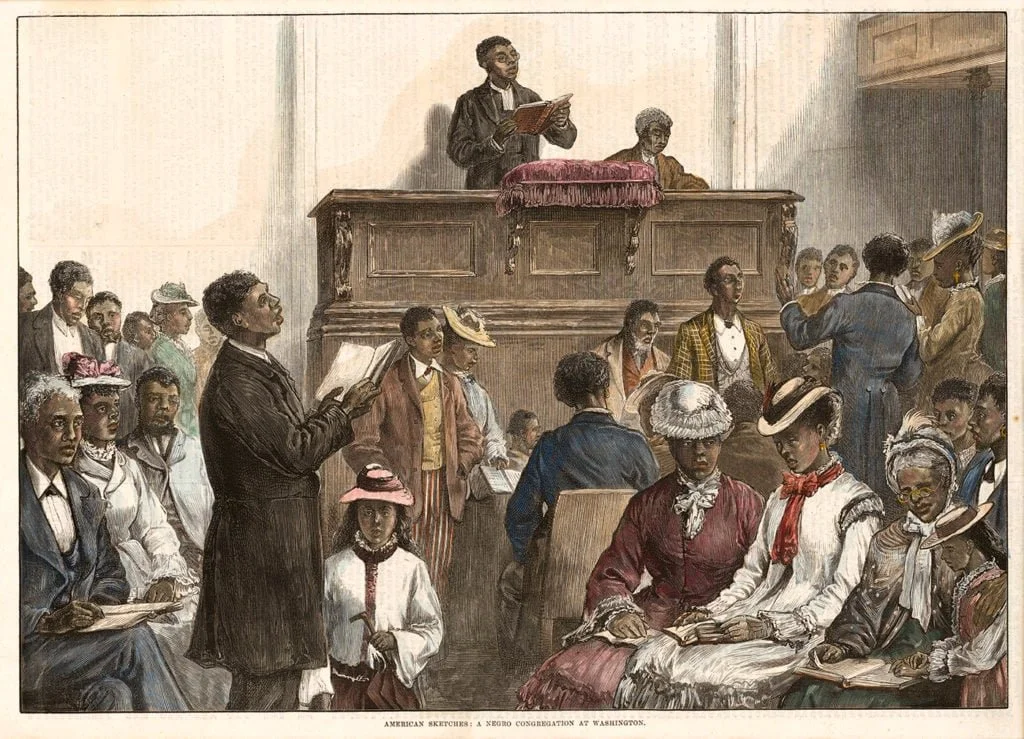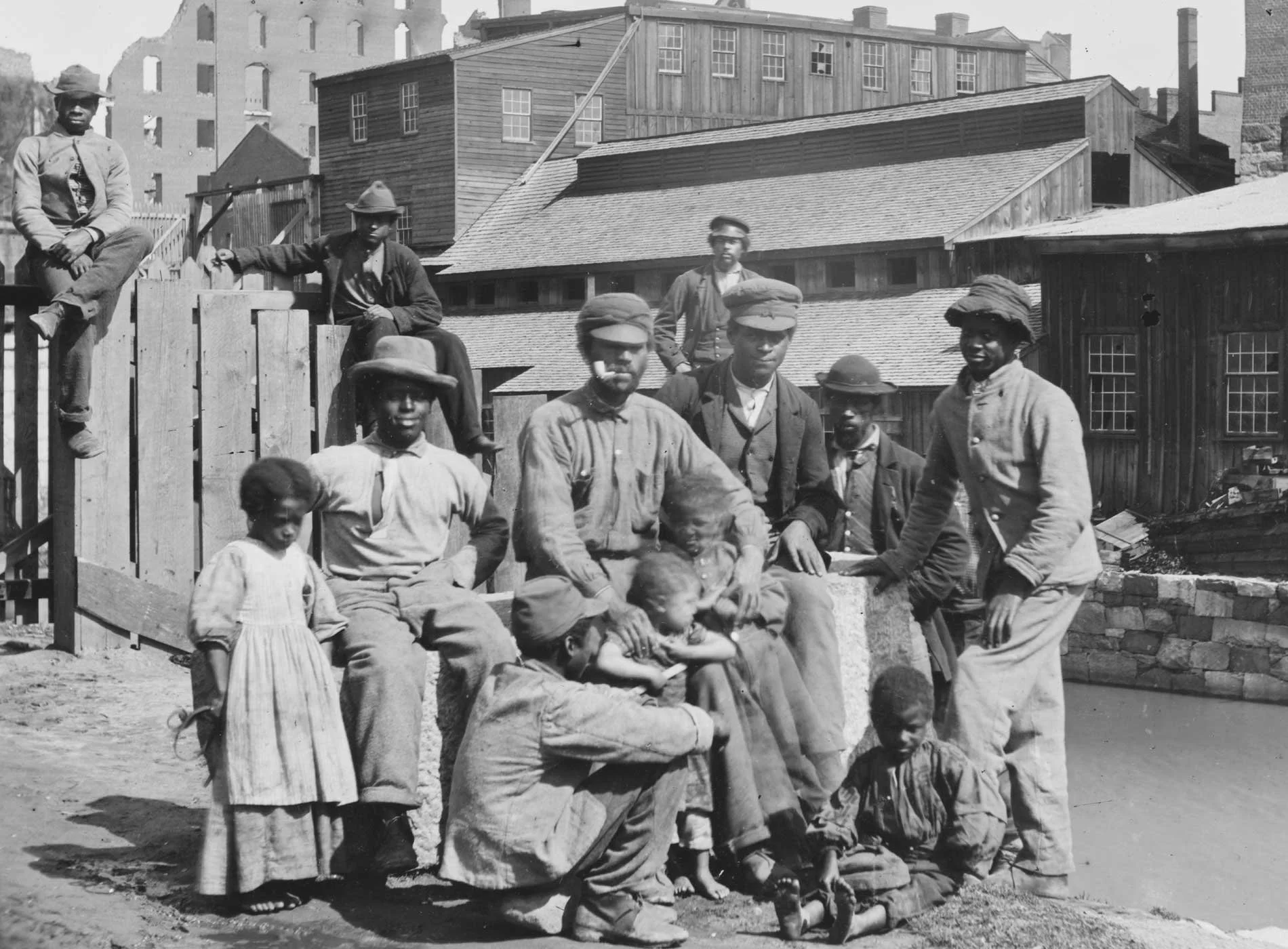Black American Christians: The Unseen Witnesses of Progress
An illustration published in The Illustrated London News on November 18, 1876. Many African Americans made education a high priority after the Civil War. Illustration from the Collection of the Smithsonian National Museum of African American History and Culture.
Witnesses During Reconstruction
The second founding of the U.S. is often regarded as post-Civil War, known as Reconstruction. This era was marked by moments and actions of rebuilding the Union and integrating millions of newly freed Black slaves into society. Slavery was abolished with the ratification of the 13th amendment in 1865, emancipating slaves across the U.S. Freed Black people had to integrate into a society filled with hostile white people and join a system not built with them in mind. Houston Halloway, a freedman, stated, “For we colored people did not know how to be free, and the white people did not know how to have a free colored person about them.” The South, having lost the war, viewed Reconstruction as humiliating, with Northern military surveillance of their governments and integration of Black Americans.
Freedmen in Richmond, Virginia, 1865.
Many Black Americans became homeless during this time or were exploited for work due to their desperate situation. Conditions for some were worse than slavery, as employers could now treat them more inhumanely without worrying about losing the value of a slave. Poverty and hardship ran rampant in Black communities in the South. Learning to read and write became accessible for Black Americans, and for a time, male Black Americans could vote, use public accommodations, and seek employment. However, in 1896, the Plessy vs. Ferguson case upheld racial segregation's constitutionality, introducing the phrase "separate but equal." The quality of Black Americans’ societal aspects was consistently inferior to their white counterparts. Even as Black communities flourished, they became collateral damage in the expansion of white society. White violence against Black progress, as seen in Wilmington, North Carolina, and Tulsa, Oklahoma, made it nearly impossible for Black Americans to vote and participate in politics, reversing much of the progress made during Reconstruction.
In response to emancipation and Reconstruction efforts, Black Americans were hopeful. They saw their freedom as part of God’s work, allowing them to worship freely. With an eagerness to learn, Black Americans engaged in literature, entered academic spaces, and developed a robust theology communicated through the Black church. The Christianization of Black Americans during slavery led to a personalized Christian religion during Reconstruction.
With the ability to worship freely, Black Americans developed the Black church, central to their social, economic, and political life. Missionary organizations, schools, and churches in the North helped develop Black Christians and Black churches in the South. Black Baptist, Methodist, Episcopalian, and Presbyterian churches appeared, becoming a central part of the Black community during Reconstruction. Black Americans gathered throughout the week to praise their liberating God, and pastors became community leaders. The Black church, witnessing extreme gratitude, played a crucial role in Black communities during this time.
Witnesses During the Civil Rights Era
The civil rights movement of the 1950s and 1960s is often referred to as the Second Reconstruction. Led by Black Americans, it aimed to make true the nation’s statement that all men are created equal. Racial segregation persisted despite legal efforts, public demonstrations, and the Brown vs. Board of Education ruling in 1954. Acts of racial violence, lynching, and sharecropping plagued Black Americans. The theological response of Black Americans to the injustice done during and after Reconstruction was one of extreme forgiveness and a persistence toward creating a just world.
With more Black Americans becoming educated, they entered academic spaces, producing literature to make sense of the Black American psyche and theology. Historically Black Colleges and Universities (HBCUs) prepared members for leadership roles in the Black community. Passionate preachers in the Black church taught forgiveness and emphasized Jesus' solidarity with the oppressed.
Dr. Albert Raboteau from Princeton University
Dr. Albert Raboteau from Princeton University speaks about the extraordinary act of forgiveness from African Americans, stating that they used their interpretation of Christianity to forgive injustices suffered at the hands of fellow Christians. Numerous stories of forgiveness from Reconstruction to the Civil Rights Era helped Black Americans survive in the U.S. Literature inspired activists and organizers, such as Howard Thurman’s book "Jesus and The Disinherited," reinforcing the perspective that God stands with the oppressed.
The theology supporting a God who supports justice gave rise to movements during the Civil Rights Era. Black Ministers became leaders advocating for those suffering in their community, exemplified by Reverend Martin Luther King Jr. and the Southern Christian Leadership Conference. Pastor and Community Developer John Perkins promoted a holistic ministry that cared for the community and developed leaders for social change. Black Christians during the Civil Rights Era modeled Jesus by advocating for and caring for the oppressed.




